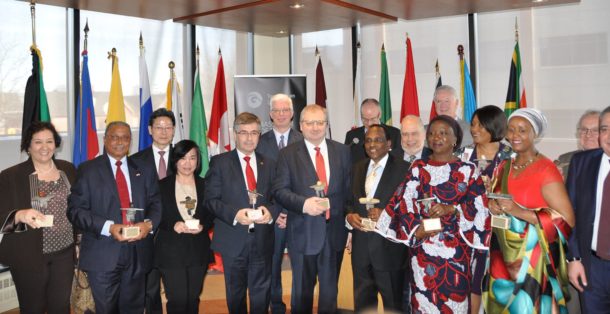Molly Bettie, exchangediplomacy.blog, September 21, 2018 Fulbright image (not from entry) from
Fulbright image (not from entry) from
This morning I came across an article about a group of ambassadors’ wives working together on economic inequality–arguably one of the greatest challenges facing the world today, alongside (and linked with) climate change. The Spirit Level is a fascinating book that makes a strong case for inequality being the root cause behind a wide range of problems, from crime to obesity, teen pregnancy to the opioid epidemic.These ambassadors’ wives, whose husbands are based at embassies in Berlin, are led by Julia Przyłębska, the wife of the Polish ambassador to Germany. Amongst their proposed projects, they want to organise international youth exchanges with a technical, environmental and agricultural focus. Przyłębska noted that diplomats’ wives have access to a highly international network of contacts, and they want to use this network to tackle collective problems:
She added that being wives of diplomats the group is in an ideal position to support those struggling against economic inequalities. She said: “Within the embassy, it is easy to bring together an international group of people from different countries in order to exchange and work together on solutions for today‘s global problems: unequal salaries and wages, the rights of the disabled and seniors, the access of the poorest to education. Also we ladies often have the advantage of having enough time, because we are rarely active professionally.” (source)
That last sentence sounds like something out of the 1950s, but it’s a good point: the accompanying spouse (male or female) of an Ambassador does have limitations on his/her career, due to the temporary and mobile nature of a diplomatic career. The realities of moving between countries for undetermined periods of time precludes having much of a professional life, and it’s something that the couple must negotiate between themselves.This story reminded me of the Fulbright wives I discussed in my chapter for the upcoming book, The Legacy of J. William Fulbright, edited by David J. Snyder, Alessandro Brogi, Giles Scott-Smith, University of Kentucky Press (forthcoming 2018).My chapter, Fulbright Women in the Global Intellectual Elite, includes a section on the contributions of accompanying spouses to the goals of public diplomacy [JB emphasis]. In my archival research, I noticed the prominence of Fulbrighters’ wives in the field–they volunteered at local schools, joined community organisations, hosted parties for their husbands’ colleagues and students, etc. In some cases, they were arguably more closely integrated into the local host community than their husbands were. By engaging in these kinds of activities, they were directly contributing to the culture learning processes that are an expected outcome of exchange diplomacy.This has observation important implications for our understanding of how public diplomacy works–who the key actors are, how people engage with hosts, what kinds of activities enable culture learning to take place. The wives were not the recipients of grants, they didn’t attend orientation programmes or briefings, they had no formal role in exchange diplomacy–yet they formed lasting ties with members of the host community and played a significant role in culture learning processes.These women (and male spouses of grantees) represent “added value” for exchange diplomacy practices. Their contribution has often been overlooked, or even discouraged. Senator Fulbright himself believed the grants should go to unmarried scholars, who would be able to focus on their work and engage with their colleagues without the ‘distractions’ of a family life. I would argue that this view is very much based on Senator Fulbright’s experience as a Rhodes Scholar. Bachelorhood was one of the original requirements of the program–the Rhodes Scholarships were even opened to women long before they were opened to married candidates (1977 vs. 1995, p. 345). This view fails to see the potential for spouses and children to enrich the culture learning experiences of an exchange programme. A spouse, particularly one who cannot work due to visa regulations and therefore has a lot of free time, can connect with locals in the community on a much broader and deeper level than the grantee can. Children can integrate their parents into local schools, parent-teacher associations, community activities and playgroups. They can represent added value for the grantee, not a mere ‘distraction’.
Original Article







